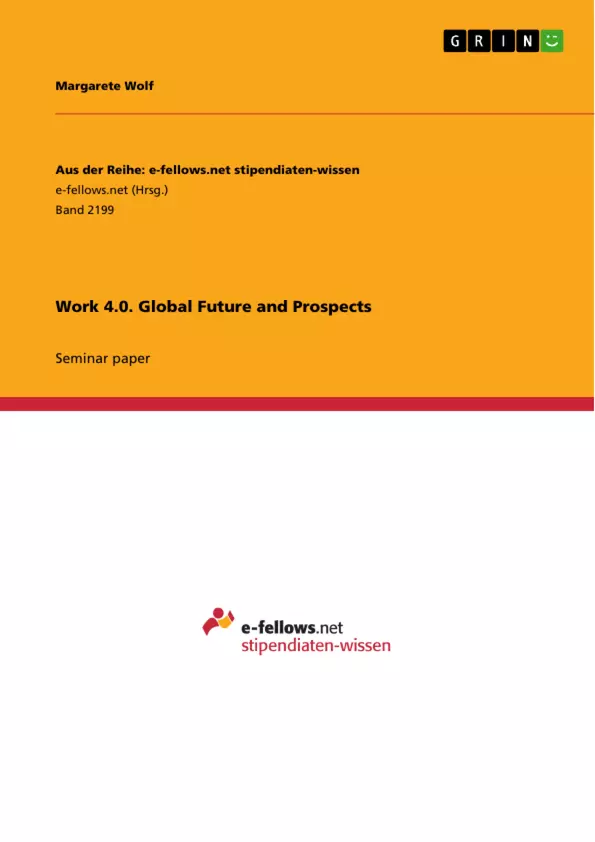This business report aims to extract a general orientation of the labour market and in which areas individuals should expect changes in the future. A variety of books and surveys from the last years inspired the research process and were helpful to delve into the topic.
The following findings include but are not limited to trends in Germany, the European Union and the rest of the world. At the beginning there is a short review of important historic inventions, after that the contemporary situation, the role of machines and their effect on people's workday are highlighted.
The results of this investigation are just an outline for general information and do not respond to every economical and sociological question that may arise, but focuses especially on technological development.
Work achieves things, makes sense to some and none to others and gives life a purpose.
What are the roots of work in an industrialized civilization and what will it be like tomorrow?
Work environments have never been changing as quick as they are right now.
Does technology play a decisive role?
And what should people be prepared for in the future?
Inhaltsverzeichnis (Table of Contents)
- EXECUTIVE SUMMARY
- INTRODUCTION
- ECONOMIC CHANGE
- A RETROSPECTIVE VIEW
- THE FOURTH INDUSTRIAL REVOLUTION
- MACHINES LEARN TO THINK
- INTELLIGENT MACHINES BECOME OMNIPRESENT
- WORK 4.0
- THE IMPETUS TO WORK
- WHAT IS WORK 4.0?
- DISSOLUTION OF ORGANISATIONAL STRUCTURES
- THE DIGITAL NETWORK ECONOMY
- CONCLUSION AND RECOMMENDATIONS
Zielsetzung und Themenschwerpunkte (Objectives and Key Themes)
This business report explores the future of work, focusing on the impact of technological advancements on the labor market. It aims to analyze the changing landscape of work environments and provide insights into the skills and adaptations individuals need to thrive in the coming years. The report draws upon research from diverse sources to provide a comprehensive overview of global trends in work.
- The impact of technological advancements, particularly in automation and artificial intelligence, on the labor market.
- The evolution of work environments, including the emergence of new organizational structures and the growth of the digital network economy.
- The need for individuals to develop new skills and adapt to the changing demands of the workforce.
- The role of government policy and business practices in shaping the future of work.
- The potential challenges and opportunities arising from technological advancements and their implications for individuals and society.
Zusammenfassung der Kapitel (Chapter Summaries)
- Introduction: Introduces the purpose and scope of the report, outlining its focus on the changing landscape of work in a global context. The report uses research from recent years to explore trends and future developments.
- Economic Change: Provides a historical overview of economic advancements, starting with the first industrial revolution and leading up to the current "fourth industrial revolution." This section highlights the key technological milestones that have shaped the modern economy.
- Work 4.0: Examines the concept of "Work 4.0," discussing the driving forces behind the evolving nature of work. This chapter explores the dissolution of traditional organizational structures and the rise of the digital network economy.
Schlüsselwörter (Keywords)
Key terms and concepts explored in this report include the fourth industrial revolution, automation, artificial intelligence, cyber-physical systems (CPS), digital network economy, work 4.0, job displacement, future skills, and the changing landscape of work.
Frequently Asked Questions
What is the meaning of "Work 4.0"?
Work 4.0 refers to the current and future transformation of the labor market characterized by digitalization, the fourth industrial revolution, and flexible organizational structures.
How does Artificial Intelligence impact future jobs?
AI and intelligent machines are becoming omnipresent, leading to the automation of many tasks. This creates a need for workers to develop new digital skills and adapt to human-machine collaboration.
What is the "Digital Network Economy"?
It is an economic system where traditional hierarchies dissolve and work is increasingly organized through global digital networks and platforms.
What skills will be important in the future labor market?
Beyond technical digital skills, flexibility, lifelong learning, and the ability to work in decentralized, non-traditional structures will be crucial.
What are Cyber-Physical Systems (CPS)?
CPS are integrations of computation, networking, and physical processes, forming the technological backbone of the fourth industrial revolution and modern manufacturing.
- Quote paper
- Margarete Wolf (Author), 2016, Work 4.0. Global Future and Prospects, Munich, GRIN Verlag, https://www.grin.com/document/343561



